| Author |
Message |
|
Kailee Rainey
|
 Posted: Fri 13 Feb, 2009 6:32 pm Post subject: Need help identifying...farm tool or sword? Posted: Fri 13 Feb, 2009 6:32 pm Post subject: Need help identifying...farm tool or sword? |
 |
|
I have friend who has had this sword for 30 years. She took it to an SCA meeting and was told it was 170-400 years old and looked asiatic or napoleanic. My husband says it looks more like a long farm implement than a sword, due to the lack of a hilt on the grip. The owner says it is a one-handed sword used for fighting on horseback and that the hole in the handle was to pull a scarf.rope through to tie to the wearer's wrist in order to prevent them from dropping the sword. THe handle is bone with a few 8 spoked wheels carved into it. The handle and grip are rustic, but the blade is incredibly sharp, with a bloodlet groove on each side. THe owner has fallen on some tough times, and is looking to see if this has any value. Any help would be appreciated.
 Attachment: 64.98 KB Attachment: 64.98 KB
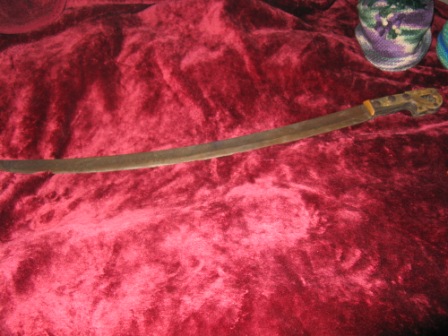
 Attachment: 51.09 KB Attachment: 51.09 KB
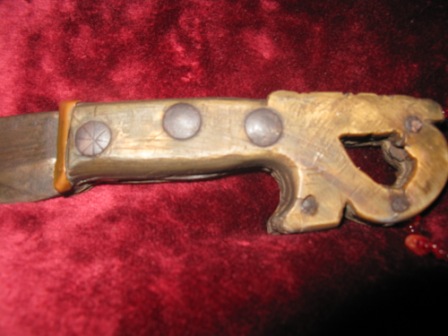
 Attachment: 53.21 KB Attachment: 53.21 KB
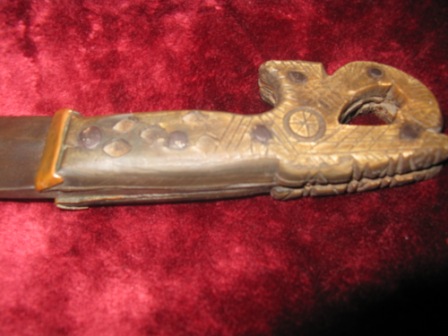
 Attachment: 36.37 KB Attachment: 36.37 KB
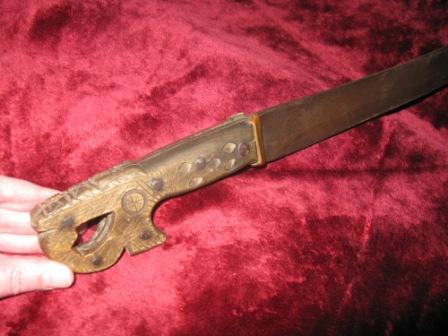
 Attachment: 34.54 KB Attachment: 34.54 KB
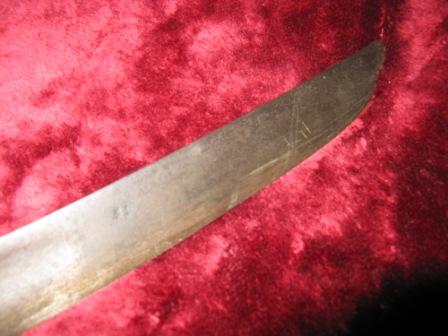
Kailee Rainey
|
|
   |
 |
|
Nat Lamb
|
 Posted: Fri 13 Feb, 2009 8:38 pm Post subject: Posted: Fri 13 Feb, 2009 8:38 pm Post subject: |
 |
|
|
The fact it has a fuller makes it unlikely it is a farming implement. Also, there are some Cossak style sabres that don't realy have any form of crosguard on them. I don't know what it is but it certainly could be a sword, and and judging by the patern you describe it sounds like it could come from the 'Stans somewhere.
|
|
  |
 |
|
Terry Crain
|
 Posted: Fri 13 Feb, 2009 8:53 pm Post subject: Posted: Fri 13 Feb, 2009 8:53 pm Post subject: |
 |
|
IMHO that's no farm instrument.
Would be helpful to have some measurements on the blade and better photo's of the blade. But clearly it appears saber- like. Perhaps a cuttoe or hunting sword, perhaps a caucus saber. Many russian, georgian, or kozak blades have hilts without crossguards. Up to WWII russians used such sabers. Never saw a handle with that exact design. The cutout is especially unique to my experience. If not original to the blade it could be a rustic rehilting, but if so, it looks quite old as well.
Use of bone and design with bosses in the hilt reminds me of hunting swords/cuttoes. If it is on the short side, (hard to tell with little to scale it against in the pictures), that would argue for cuttoe/hunting sword which were short sword length usually. If it slonger, that would support a cavalry type saber. It doesn't look arabic but possilbly could be Islamic saif type saber as well. Berber? Zanzibar? Very interesting.
But regardless, I would not think it is a farm implement.
A nice puzzle to figure out. More pictures and measurements would be helpful. How does the balance feel?
A cool little piece IMHO.
Terry
Terry Crain
A/K/A
Donal Grant
Honor, not Honors!
|
|
  |
 |
Jonathan Eells

|
 Posted: Fri 13 Feb, 2009 9:33 pm Post subject: A leaf spring sword Posted: Fri 13 Feb, 2009 9:33 pm Post subject: A leaf spring sword |
 |
|
|
I'd bet a six pack that this sword was made from a leaf spring, probably off a truck. The hole in the handle fits with the leaf spring idea. I saw a ton of swords like this one in East Africa, back in the day.
|
|
  |
 |
|
Terry Crain
|
 Posted: Fri 13 Feb, 2009 10:36 pm Post subject: Posted: Fri 13 Feb, 2009 10:36 pm Post subject: |
 |
|
I looks like it has elements of a Cossack Shasqua, but the large handle hole does seems odd for that. North or East African? That may be, as it does have that tribal, roughly put together look that you sometimes see in such pieces. A leaf spring may explain the handle whole as you say. Really tough to be sure of anything without seeing the piece up close.
Terry
Terry Crain
A/K/A
Donal Grant
Honor, not Honors!
|
|
  |
 |
|
Jeff Demetrick
|
|
  |
 |
|
Kailee Rainey
|
 Posted: Sun 15 Feb, 2009 2:40 pm Post subject: Thanks Jeff Posted: Sun 15 Feb, 2009 2:40 pm Post subject: Thanks Jeff |
 |
|
That photo looks amazingly close to my friend's sword. Thank you giving us a direction to go! I dont have the sword in front of me, but I would guess the blade is over 2' long. probably even longer than 2.5'. Do you have any idea how old this would be? Was the SCA guy correct in the 180-400 year guess? I will look on the forums for a nearby reputable appraiser. Thanks for any help you can give her.
Kailee Rainey
|
|
   |
 |
|
Jeff Demetrick
|
 Posted: Sun 15 Feb, 2009 4:35 pm Post subject: Posted: Sun 15 Feb, 2009 4:35 pm Post subject: |
 |
|
Hi Kailee,
These are usually 19th-20th century. Although they are fairly rare they usually don't fetch too much on e-bay.
All the Best
Jeff
|
|
  |
 |
Elling Polden

|
 Posted: Mon 16 Feb, 2009 3:26 am Post subject: Posted: Mon 16 Feb, 2009 3:26 am Post subject: |
 |
|
Swords like these are often of african origin, and where quite common souverirs for sailors and such in the 1900s. There are a lot of them hanging on walls in Norway, for instance, because of this.
"this [fight] looks curious, almost like a game. See, they are looking around them before they fall, to find a dry spot to fall on, or they are falling on their shields. Can you see blood on their cloths and weapons? No. This must be trickery."
-Reidar Sendeman, from King Sverre's Saga, 1201
|
|
    |
 |
Hal Siegel
Industry Professional

Location: Austin, Texas Joined: 30 Aug 2003
Posts: 113
|
|
   |
 |
Jonathan Eells

|
 Posted: Mon 16 Feb, 2009 4:20 pm Post subject: THE POWER Posted: Mon 16 Feb, 2009 4:20 pm Post subject: THE POWER |
 |
|
|
Yet again the sheer power of myArmoury is revealed! It's like having access to the Jedi Archives.
|
|
  |
 |
|
Terry Crain
|
 Posted: Mon 16 Feb, 2009 7:36 pm Post subject: Posted: Mon 16 Feb, 2009 7:36 pm Post subject: |
 |
|
Hey Hal,
Very nice grouping. Got quite the Berber armoury there. Very cool.
Best,
Terry
Terry Crain
A/K/A
Donal Grant
Honor, not Honors!
|
|
  |
 |
Ian Hutchison

Location: Louisiana / Nordrhein-Westholland Joined: 27 Nov 2007
Posts: 626
|
 Posted: Mon 16 Feb, 2009 8:36 pm Post subject: Posted: Mon 16 Feb, 2009 8:36 pm Post subject: |
 |
|
Nice collection Hal! Do your swords have any European markings on them? I've heard that many eastern swords re-used European military blades.
'We are told that the pen is mightier than the sword, but I know which of these weapons I would choose.' - Adrian Carton de Wiart
|
|
  |
 |
Hal Siegel
Industry Professional

Location: Austin, Texas Joined: 30 Aug 2003
Posts: 113
|
 Posted: Tue 17 Feb, 2009 6:38 am Post subject: Posted: Tue 17 Feb, 2009 6:38 am Post subject: |
 |
|
| Terry Crain wrote: |
Very nice grouping. Got quite the Berber armoury there. Very cool.
|
Hey, Terry, nice to "see" you, since I haven't made it up to Pennsic in years!
| Ian Hutchison wrote: |
Nice collection Hal! Do your swords have any European markings on them? I've heard that many eastern swords re-used European military blades. |
No, none of the Berbers have any markings on them, which is actually kind of unusual for northern African swords.
I think the "eastern swords with European blades" meme is for the most part due to a Eurocentric denial of the craft abilities of other peoples - certainly there are many examples where European blades were re-hilted and re-used, but there are many more examples where the blades are locally made. Further confusing the issue is the use of sword marks as advertising - much like the profusion of "Andrea Ferrara" running-wolf marks that appeared on blades all over Europe as a sign of quality (whether or not they were actually made by Ferrara); northern African blades tend to have a profusion of marks, particularly stylized moons and stars, a "this is the good stuff!" mark that was copied from 1700's central and eastern European blades (the moons and stars can be seen on a lot of Austrian and Hungarian and Bohemian swords blades of the time), and the "you can be sure if it's stars and moons!" advertising traveled south through the 18th century. (This is also the mark you'll see on a lot of Sudanese kaskara, a cruciform style sword that some folks mistakenly think are "made from old crusader sword" blades.)
Hal Siegel - TherionArms
http://www.therionarms.com
http://www.facebook.com/TherionArms
|
|
   |
 |
|
|

